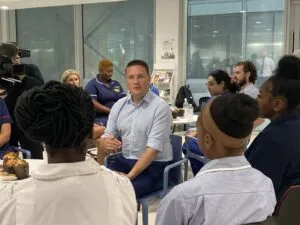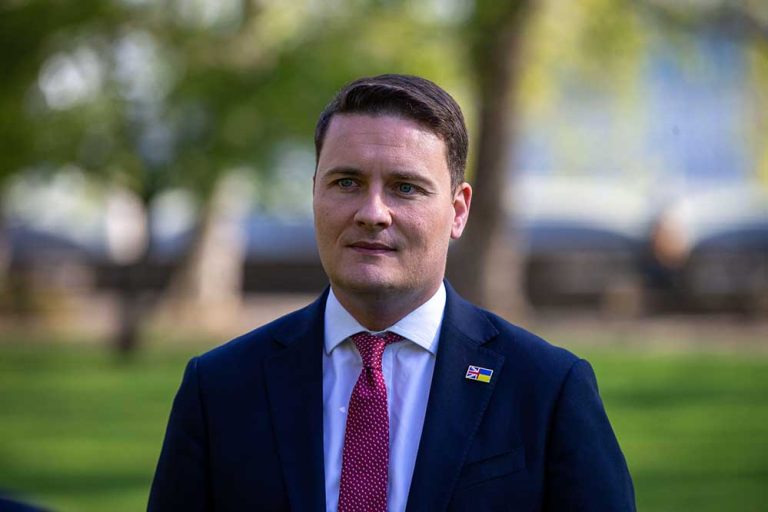Newly qualified nurses should no longer be “making coffees, pulling pints or stacking shelves” under the government’s new graduate guarantee, health and social care secretary Wes Streeting has pledged today.
Speaking to Nursing Times, Mr Streeting warned that the rising number of newly qualified nurses turning to retail and hospitality due to a lack of graduate roles posed a serious threat to the government’s NHS reform agenda.
“There is a bright future for nursing, but we also need to make sure that we are moving towards that bright future today”
Wes Streeting
It comes as ministers today unveiled a new ‘graduate guarantee’ to tackle the growing difficulties that newly qualified nurses and midwives are facing when looking for jobs.
The guarantee – which will come into force this summer – has pledged to make thousands of new posts easier to access by removing barriers for trusts.
NHS providers will be able to recruit newly qualified nurses and midwives before vacancies formally arise, with trusts supported to employ staff based on projected need rather than headcount.
Mr Streeting highlighted that the guarantee followed “intensive work” with the Royal College of Nursing and the Royal College of Midwives, with the initiative rolling out “university by university, trust by trust”.
While funding for the initiative remains unclear, he noted that the scheme would be supported by ongoing work to “clamp down” on international recruitment, agency spend and re-diverting resources.
A key part of the scheme will see vacant maternity support worker posts temporarily converted into band 5 registered midwife roles, backed by £8m from the Department of Health and Social Care.
Mr Streeting indicated that nursing support worker roles would also be converted under the scheme but did not say how that would be funded.
“Where we might have created more healthcare support worker jobs, we’ve instead decided to create new nursing jobs instead,” he explained.
“That will create the number of vacancies needed to meet the number of qualifying nurses and midwives this summer.”
Meanwhile, newly qualified nurses and midwives will also be offered additional support under the scheme, including through an online hub which will provide information and advice for those applying for roles.
The graduate guarantee comes in response to the demoralising job search currently faced by many newly qualified nurses and midwives.
Mr Streeting argued that some of the recruitment struggles stemmed from “encouraging factors” such as improvements to nursing and midwifery retention.
“It might create a bit of a short-term challenge but that is a really good problem to have,” he told Nursing Times.
“The fact we’re hopefully seeing more people wanting to stay, to be part of the team that leads the NHS recovery is a good thing, but we owe it to students to make sure that the nurses and midwives the future have those great jobs to go to.”
Mr Streeting visited University College Hospital today in London, where he spoke to many final-year students about their concerns about finding employment.

Wes Streeting speaking to student and newly qualified nurses at University College Hospital
One newly-qualified nurse described how only 10 people in her cohort were offered a role at the trust, while another said he had resorted to working as a healthcare assistant until a role became available.
Nursing Times previously reported on how nurses were being forced to take work in supermarkets and coffee shops to make ends meet while they search for their first role.
Responding to this, Mr Streeting said: “When entering their courses, [nurses] envisage spending the rest of their lives in this career.
“I do not want to see them making coffees, pulling pints or at the checkouts or stacking shelves,” he said.
“Because with great respect to people who do those jobs, those nurses [and] those midwives are really qualified, highly skilled, to do something that the NHS desperately needs them to be doing.
“And the whole driving impetus behind the graduate guarantee is to make sure that people who’ve spent years of their life training in something they love are able to put those skills to work for the benefit of patients.”
Asked how the government would ensure accountability from trusts in implementing the guarantee – amid ongoing recruitment freezes and faced with government-mandated cost savings – Mr Streeting said some graduates may need to work outside their training trusts.
“For some nurses and midwives, they may not be able to get a job in the trust that they’ve trained in,” he said.
“So people might have to think a bit more flexibly about where they go,” he said. “But the important thing is that people will have jobs to go to.”
The upcoming 10-year workforce plan for the NHS would ensure that the health service does not “end up back in this situation year after year”, Mr Streeting added.
He did not give indication of specific measures that nurses can expect to see in the plan – due this autumn – but said he was working closely with trade unions to look at “a wide range of issues” from pay structure and training to career progression.
He added: “I think there is a bright future for nursing, but we also need to make sure that we are moving towards that bright future today, and that’s why the graduate guarantee is really important in that context.”
England’s chief nursing officer Duncan Burton also spoke to Nursing Times about his hopefulness of the graduate guarantee.
He said he wanted to “challenge some of the historical assumptions” about where newly qualified nurses can start their careers, and emphasised the importance of exploring all settings, including community and social care.
“In some places [there are] great places in the community for newly qualified nurses to start their career, but you go ten miles down the road and that’s not seen in the same way,” Mr Burton said.
“So we’ve got to really challenge ourselves as a profession about where roles are for newly qualified nurses, [and] open those up to all of our graduates.”
Mr Burton emphasised how “every part of this country needs nurses and midwives”.
He added: “For those people that have trained, want to be a nurse and midwife, it’s so important that that’s the job that they go into and have a lifelong career in the professions.
“That’s what we, with the guarantee today, absolutely want to support,” he said.

